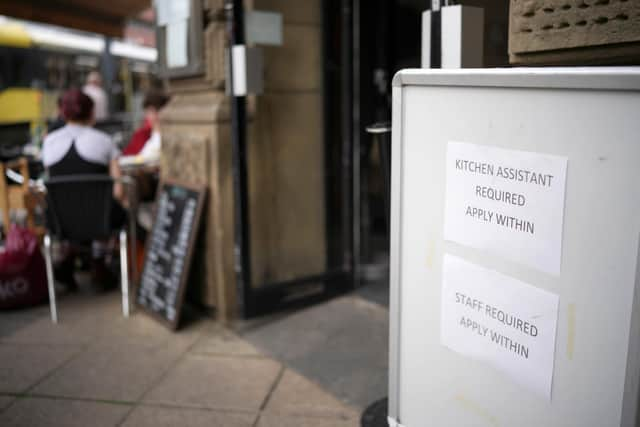How hospitality can boost its ranks and serve up a stronger future - Antony Woodcock comment
However, at the same time, unemployment figures are falling as the UK opens up again. The inability to find workers was forewarned as a possible risk following Brexit, and when looking at the current staffing situation across sectors, it seems some of these fears are now playing out.
The UK is currently in a staffing and skills shortage across the board, from chefs and waiters to warehouse operatives and welders. No industry has been left unscathed, however the pandemic has created a particularly unique situation in the world of hospitality.
Advertisement
Hide AdAdvertisement
Hide AdWhilst the sector was forced to close its doors for extended periods across the past two years, its regular workforce had no choice but to look elsewhere for employment, particularly those on short-term or zero-hours contracts. But, now the world has begun opening up once more and venues work on returning to full capacity, those displaced workers who left the industry do not appear to be returning at the same rate at which they left.
There are likely many explanations as to why this has been the case. Initially, the uncertainty caused by the lockdown period made hospitality a less attractive prospect in the immediate term, with the opportunity to work enough hours being limited and the unpredictable threat of changes to restrictions. As the risk of lockdown pulls further out of view, there is a hope that the number of workers returning to the sector will pick up once more.
However, a much more concerning issue has been those members of the workforce who have chosen not to return because they no longer view the sector as a viable career path altogether. With a more competitive labour market than ever before, the industry must come together to generate fresh thinking within hospitality recruitment, so that we can bring life back into the sector.
Ultimately, solving the staffing shortage in hospitality requires a two-pronged approach. The first question focuses on the present – what can be done to plug the gap and stop the bleeding? Businesses need staff now more than ever, and it’s key that we can attract workers to allow the industry to bounce back as much as it can post-pandemic.


In the longer term, the issue may be one that requires more strategic thinking – attracting enough young people and new entrants who view hospitality as a viable career for the future.
Competition
In the short term, there’s an elephant in the room – rethinking rates of pay. Hospitality firms are no longer just competing with traditional rivals like the hotel next door, but with the local Amazon warehouse, and more attractive prospects for hours, pay and flexibility. In this current climate, it seems it is unsustainable to continue hovering a few pennies over the minimum wage.
And this doesn’t just cover entry-level staff. To really promote the industry as offering careers, rather than just jobs, we must ensure more senior team members or office-based personnel stay ahead of the base rate of pay by the same margin that they are currently.


This might mean businesses have to absorb the costs for the time being, until real wages catch up with inflation and the additional expense can be passed onto the consumer. After all, these costs should then be recovered by the exponential long-term benefits of an improved staffing pool.
Advertisement
Hide AdAdvertisement
Hide AdHowever, it’s not always about the money. In the current economy, younger workers are less able to consider working for retirement, and they don’t want to have to hold back on travelling the world or gaining new experiences. This generation wants the opportunity to explore all that life has to offer, and the gig economy can give them the tools they need to be able to achieve this.
Flexibility
The key is flexibility – both in a business’s hiring strategy and its employment offering. Hospitality companies need to stop trying to fit round pegs into square holes – and accept that their worker pool will likely need to be larger to fill the same number of hours. As labour becomes harder to find, businesses need to provide a more flexible approach to the contracts and the hours they have on offer in order to attract a wider audience.
This new audience would include students, but may also capture retirees, or stay-at-home parents. The downside is often said that flexibility can be much harder to manage, but there are now plenty of software solutions to help make rota-management easy.
To sustain the industry into the future, hospitality needs a makeover. It is not a sector of choice for the younger generation and, more importantly, it’s not an industry of choice for their parents, who form a huge role in shaping those early career choices. TV show Hell’s Kitchen may be good entertainment, but it is a throwback to a bygone era that communicates an out-of-date and inaccurate message. The rhetoric it displays matches broader perceptions of the industry: hard work, low pay, and poor treatment.
Unless a collective effort is made to combat negative perceptions, the industry will continue struggling to attract talent. Hospitality is a global, culturally diverse industry that has endless potential for career-progression based on true meritocracy. This is a message that should resonate with the youth of today, but it is one that many within the industry have not been shouting loudly enough about.
Antony Woodcock, co‑founder and managing director of GIG, an app to find flexible shift work
Comments
Want to join the conversation? Please or to comment on this article.
